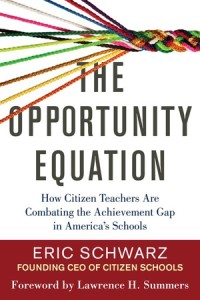The Essential Starting Point Is Empathy
This post is by Eric Schwarz, Co-Founder and CEO of Citizen Schools. Two moving articles I've read in the last week have reminded me of a primary reason I started Citizen Schools -- one that has nothing to do with the education of children, or at least not directly.
Is A Hard Life Inherited? by Nicholas Kristof in The New York Times told the story of the growing isolation and impoverishment of the working class neighbors he grew up with in rural Yamhill, Oregon. A few bad choices combined with slim opportunities led boyhood friends of Kristof's to feel increasingly isolated from either the idea of or the reality of an opportunity society. Smart creative children are now too often jobless, in prison, or on drugs. Kristof describes the crisis facing working class men in Yamhill and in rural towns and inner cities all across America and then ends by wishing more of his privileged colleagues in journalism and business had more first-hand exposure to life near the poverty line. "There are steps that could help," Kristof writes, "including a higher minimum wage, early childhood programs, and a focus on education as an escalator to opportunity. But the essential starting point is empathy."
On Sunday The Boston Globe wrote a powerful story, The Working Poor Who Fight To Live on $10 an Hour, that profiled a number of Bostonians living on the financial edge. I was particularly moved by the story of Larry McCain, a man my age who described working since the age of 8, starting with sweeping up hair at a barber shop and searching for stray golf balls at Dorchester's Franklin Park Golf Course, about a mile from where colleagues and I started Citizen Schools a few decades later. Until he was fired recently, McCain worked at Logan airport, cleaning used food trays and inspecting new ones. He was earning $9 an hour, meaning that he relied heavily on the local food bank to eat and can only afford the rent in his 130-square foot rooming house apartment because of a discount he gets for cleaning the common bathroom shared by several tenants.
 Over the years I have been in a few dozen apartments like McCain's, first when I accompanied my Mom on visits to see her students as a teacher in East Harlem, then as a journalist in Oakland and Quincy, MA, and most notably meeting with students from Citizen Schools when we were getting the program started. Recruiting into Citizen Schools the children of Moms and Dads who worked hard but still lived below or barely above the poverty line was a big part of my job. As I write about in my book, The Opportunity Equation, these conversations were deeply moving for me. I was just starting a family myself, and while in some ways my life was very different from that of the parents we worked with, in so many other ways we saw things eye to eye.
Over the years I have been in a few dozen apartments like McCain's, first when I accompanied my Mom on visits to see her students as a teacher in East Harlem, then as a journalist in Oakland and Quincy, MA, and most notably meeting with students from Citizen Schools when we were getting the program started. Recruiting into Citizen Schools the children of Moms and Dads who worked hard but still lived below or barely above the poverty line was a big part of my job. As I write about in my book, The Opportunity Equation, these conversations were deeply moving for me. I was just starting a family myself, and while in some ways my life was very different from that of the parents we worked with, in so many other ways we saw things eye to eye.
A primary goal of Citizen Schools has always been to give young people extra learning time, extra mentoring, and extra chances to successfully engage in hands-on, real-world projects. But that is not the only goal. Another primary goal is to build understanding and empathy among those who hold power today. When our Citizen Teachers -- many of them financial advisers and engineers and white shoe lawyers -- make their way into urban schools on the other side of the tracks from where they live and work, they build empathy. The kids get access to a new world. And so do the adults. Statistics become faces. Hopeless narratives you see on TV become hopeful narratives you see in front of you. Inner-city kids become creative problem solvers and eloquent defenders of their ideas.
My hope has always been that eventually the adults involved with Citizen Schools will realize the urgency of lifting opportunity for all, as many of them already do. "Those" kids become "our" kids, or "my" kids. Eventually, as with Lindy Smalt, an AmeriCorps Teaching Fellow profiled in my book, the mentors in Citizen Schools have their justice nerves awakened. For Lindy, the epiphany came from her work with Abdellah, a student in her class. "He is small and gets swallowed in large classes of screaming, sassy preteens," she wrote. "But he is diligent, positive, and extremely kind, and he deserves a chance. And there are millions more like him."
I hope you will join me at an upcoming book event (see list here) and pre-order the book for yourself and for a favorite teacher or mentor in your life.
